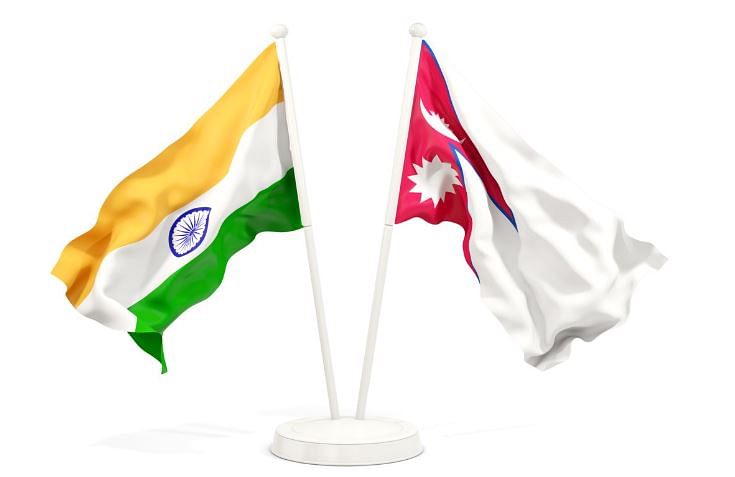
A series of events in the recent past have indicated beyond doubt that India-Nepal ties seem to be headed towards an irreversible downward spiral. In an unprecedented move, both the Houses of Nepal’s Parliament cleared a new map that depicts Indian territory as Nepal’s. Lipulekh, Kalapani and Limpiyadhura are included in this new map as territories of Nepal.
India has debunked any claims to these areas by Nepal by saying, “This artificial enlargement of claims is not based on historical fact or evidence and is not tenable. It is also violative of our current understanding to hold talks on outstanding boundary issues.”
The immediate trigger for Nepal’s assertive steps to claim these ‘disputed areas’ arose after Kathmandu protested against the opening of an 80-km road to Lipulekh on the Chinese border by India in May.
These sovereignty contestations have been simultaneously going on with other steps from Nepal that do not augur well for bilateral relations. For instance, Nepal deployed Armed Police Force (APF) near Kalapani at Chhangru, on the Nepalese side of the border last month. In a step that marks Nepal’s hardening stance towards India, the Nepali Army is building a helipad and has established a camp of tents at the Indo-Nepal border. Besides, the Nepali Army also built a post 40 km before Kaalapani at a place called Malabar a week ago. Recently, the Nepali police opened indiscriminate fire on Indians at the India-Nepal border in Sitamarhi district in Bihar, killing a farmer and injuring four others.
In this series of steps by Nepal, there is an unprecedented political, cartographic and institutional assertion from Nepal that India-Nepal relations have not witnessed in their bilateral history. Nepal’s assertive behaviour and assertion of sovereignty have to be seen in three broad contexts.
First, the Oli government’s domestic political agenda that thrives on an anti-India discourse. As such, a constitutional amendment is a tool being used by Prime Minister Oli to consolidate his position within the Nepal Communist Party. In this regard, a domestically unifying narrative built on external ‘national security’ threat is all he needs. For some years now, Nepal’s domestic politics has been free-riding on anti-India politics.
The Modi government’s decision in 2015 to impose the border blockade added fuel to the fire to this campaign. These sentiments have been compounded by what Nepal considers a diplomatic ‘snub’ by New Delhi. The Himalayan country has claimed that its repeated requests for a foreign secretary or foreign minister-level talks have been ignored by New Delhi. India has asserted that such claims are false and the India-Nepal talks have been delayed by the on going pandemic.
The issue of sovereignty is a strong and safe base for any state to place its contestation on, and still manage to keep all domestic stakeholders together. For Nepal, whose internal politics is divided by the Madheshi/Terai politics, contested sovereignty with India has worked as a politically unifying factor. Among many reasons, this is because for Nepal, India is ‘external’ in character.
Second, Nepal’s growing confidence in China to fill the strategic void, should ties with India derail completely, is all too clear with Chinese investment patterns in Nepal and its leadership’s growing proximity with China. There are two broad predictable consequences coming out of this political change of heart in Nepal.
The first relates to an inevitable downgrading of India-Nepal ties even as both India and Nepal have hardened their positions on the sovereignty issue. With a heated debate in Indian civil society and its strategic community after a murderous brawl with the Chinese army and Chinese claims on the entire Galwan region, it should be foolhardy for Nepal to think of any concessions on India’s position.
Smacks of collusion
The second is the issue of China’s backing of Nepal. Chinese investment patterns in Nepal and the proximity between Nepalese leadership and China smacks of a collision. Tweets from a Chinese diplomat pointing to a potential border clash between India and Nepal as a new front, unravels the larger collusion. This also ties with China’s larger design in South Asia, that in its most recent form has emerged in the ‘wooing’ of Bangladesh in areas that are stacked against Indian interests.
Third, Nepal’s steps psychologically signal a strategic version of the ‘Napolean complex’ where a much smaller nation seeks parity with a big power next door through overly-aggressive political steps, notwithstanding its capabilities’ deficit. The psychological perspective of China’s support in the areas of finance, infrastructure, and development has prompted Nepal to a series of steps against India.
However, already, the steps by Nepal are proving unsustainable. The ruling Nepal Communist Party stands a divided house with top leaders questioning moves to align with the Communist Party of China at a time when ties between India and China are almost hostile. Nepal’s steps per se would have been negotiable with India but an ongoing dispute with China, along with China as a tacit third party in the dispute, puts the dispute in a non-negotiable realm.
Nepal should be wary that China’s unstinting support does not catapult to political ego leading to steps that become domestically unsustainable and externally hostile. This could in turn depend on the next steps by Oli government in Nepal, especially on matters that impinge on its relations with India. India should also be careful about Nepal internationalising the dispute by dragging India to the International Court of Justice.
India should watch out for streaks of ‘Napoleon complex’ in Nepal’s behaviour, especially with China’s shadow lurking in the background. Kathmandu’s domestic pandering could very well be complemented by an international grandstanding backed by victimhood.
(Mishra is Deputy Director, Kalinga Institute of Indo-Pacific Studies, Bhubaneswar & Research Fellow, ICWA, New Delhi; Choudhary is Doctoral Research Scholar, Centre for Russian and Central Asian Studies, JNU, New Delhi)